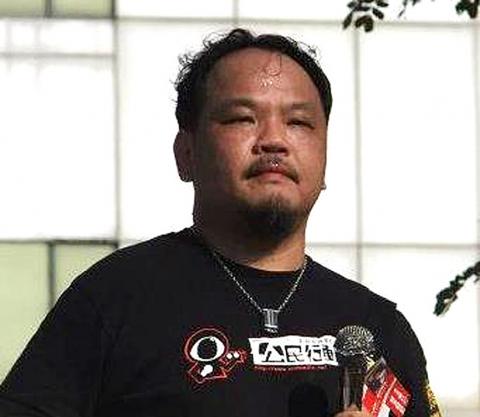In all his years of social activism, nothing had been more shocking to him than his first experiences in 1988, when he first felt that the mainstream media’s portrayal of social activism was not truthful and indeed often maligned such activities, National Chung Cheng University associate professor Kuang Chung-hsiang (管中祥) said.
Kuan said his civil media archive project initiated six years ago has helped students record more than 1,500 pieces of news.
“It is an effort to preserve the real sounds and actions of the civic activities that have been passed by, or misrepresented, by the mainstream media,” he said.

Photo provided by Kuan Chung-hsiang
Media reform is not just about changing the current circumstances of the media industry, it is also about letting society’s diverse voices be heard in order to have more dialogue, Kuan said.
Unwilling to become simply an academic that talked of grandiose schemes, but did not turn them into reality, Kuan said he took part in numerous protests and rallies appealing for media reforms, and had also worked closely with civic organizations during the six years when he was president of Taiwan Media Watch.
Giving an example of his actions, Kuan singled out an incident in 2006 when the organization protested the headline of an article in the Chinese-language United Daily News for discriminating against psychiatric patients.
“We hired buses to transport patients and staged a protest in front of the United Daily News building, and though the news company did not apologize, the protest prompted organizations for physically handicapped individuals to pressure the Legislative Yuan into amending the People with Disabilities Rights Protection Act (身心障礙者權益保障法) and write into law anti-discrimination regulations for the first time,” Kuan said.
“I was very happy that day, because my efforts had helped people regain their rights, and it also shows how citizens truly have [the] power [to affect government policy],” he said.
Media reformation is only a means to an end — a way to implement basic democratic values such as social diversity and promote social equality, to let people see each other for what they are and accept each other, Kuan said, adding that civic organizations and non-governmental organizations needed to make media reform a top priority.
Without media reform, organizations’ voices and opinions cannot be heard, and thus society will not advance, hence leading to an undemocratic society that speaks in a monotone, Kuan said.
In order to implement his ideals, Kuan works with the civil media archive so that social activists may rest assured that their activities would not be edited out and left to be forgotten.
“Today’s news is tomorrow’s history, but while the mainstream media records the history of prominent figures and significant issues, civilian history is being ignored,” Kuan said.
For example, he said, in the 80-second TV news coverage of the massive protest on Aug. 18, during which protesters held an overnight demonstration in front of the Ministry of the Interior building in Taipei over its handling of the Dapu Borough (大埔) incident, almost every news channel only replayed footage of how students climbed over the walls, how they pushed against the police or how Deputy Minister of the Interior Hsiao Chia-chi (蕭家淇) was drenched in water, Kuan said.
However, there was not one channel that reported on the footage of how the event organizers asked participants to lower their voices and not to shout slogans in fear of disturbing patients in the nearby National Taiwan University Hospital, he said.
“Civil media archives recorded those scenes and preserved the chance for all sides of the story to be heard by society,” Kuan said.
According to Kuan, the archive is only able to hire two full-time staff who are tasked with both editing and filming, adding that he hopes to raise more funds so special correspondents can be hired to work with the archive in central and southern Taiwan.
“The media needs to be reformed and society needs to be reformed, but this cannot just be a solitary effort by media organizations and civilian organizations; it’s an effort that must involve every citizen,” Kuan said.
“We also hope to spread our knowledge to more civilian organizations and in the process churn out more citizen reporters — reporters who will be able to record the true voices of civil society,” Kuan added.

The Taipei City Government yesterday said contractors organizing its New Year’s Eve celebrations would be held responsible after a jumbo screen played a Beijing-ran television channel near the event’s end. An image showing China Central Television (CCTV) Channel 3 being displayed was posted on the social media platform Threads, sparking an outcry on the Internet over Beijing’s alleged political infiltration of the municipal government. A Taipei Department of Information and Tourism spokesman said event workers had made a “grave mistake” and that the Television Broadcasts Satellite (TVBS) group had the contract to operate the screens. The city would apply contractual penalties on TVBS

A new board game set against the backdrop of armed conflict around Taiwan is to be released next month, amid renewed threats from Beijing, inviting players to participate in an imaginary Chinese invasion 20 years from now. China has ramped up military activity close to Taiwan in the past few years, including massing naval forces around the nation. The game, titled 2045, tasks players with navigating the troubles of war using colorful action cards and role-playing as characters involved in operations 10 days before a fictional Chinese invasion of Taiwan. That includes members of the armed forces, Chinese sleeper agents and pro-China politicians

The lowest temperature in a low-lying area recorded early yesterday morning was in Miaoli County’s Gongguan Township (公館), at 6.8°C, due to a strong cold air mass and the effect of radiative cooling, the Central Weather Administration (CWA) said. In other areas, Chiayi’s East District (東區) recorded a low of 8.2°C and Yunlin County’s Huwei Township (虎尾) recorded 8.5°C, CWA data showed. The cold air mass was at its strongest from Saturday night to the early hours of yesterday. It brought temperatures down to 9°C to 11°C in areas across the nation and the outlying Kinmen and Lienchiang (Matsu) counties,

STAY VIGILANT: When experiencing symptoms of carbon monoxide poisoning, such as dizziness or fatigue, near a water heater, open windows and doors to ventilate the area Rooftop flue water heaters should only be installed outdoors or in properly ventilated areas to prevent toxic gas from building up, the Yilan County Fire Department said, after a man in Taipei died of carbon monoxide poisoning on Monday last week. The 39-year-old man, surnamed Chen (陳), an assistant professor at Providence University in Taichung, was at his Taipei home for the holidays when the incident occurred, news reports said. He was taking a shower in the bathroom of a rooftop addition when carbon monoxide — a poisonous byproduct of combustion — leaked from a water heater installed in a poorly ventilated